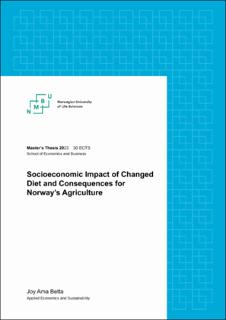| dc.description.abstract | This thesis examines the socioeconomic impact of a changed diet and its consequences for Norway's agriculture. The main objectives of this research are to assess the health benefits to society resulting from the adoption of the Norwegian Dietary Guidelines (NDG) and to analyze how this dietary shift affects the agricultural sector in Norway. The study utilizes data from the Global Burden of Disease (GBD) on Disability-Adjusted Life Years (DALYs) associated with dietary risk factors such as low intake of fruits, vegetables, whole grains, fish (Omega-3), and high intake of red meat. Additionally, the NORKOST 3 survey data was employed to compare individuals' current dietary patterns with the recommended diet outlined in the NDG. Using linear optimization techniques, three models were developed to determine the optimal quantities of the maximum diet compared to the current consumption (TMREL), the current consumption and the consumption according to the Norwegian Dietary Guidelines.
The key findings reveal that switching to the diet recommended by the NDG brings economic benefits to society, as evidenced by an increase in overall utility. Moreover, adhering to the NDG leads to a freeing up of land space that can be used for cultivating more crop products instead of animal feed. These findings have significant implications, enabling households to make informed dietary decisions, informing health institutions about the role they play, and increasing awareness of the benefits associated with aligning diets with dietary recommendations.
Overall, this research contributes to the field of study by providing insights into the socioeconomic impact of dietary changes and the implications for agriculture. It highlights the potential economic benefits to society, the potential for more sustainable land use, and the importance of promoting and adopting dietary recommendations for improved public health and agricultural practices. | |
